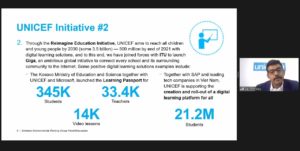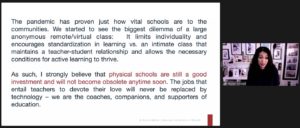“From Textbook to Tech-Savvy: Understanding COVID’s Impact on the Education System”
EEG hosted its 2ndPanel Discussion of the year under the title of “From Textbook to Tech-Savvy: Understanding COVID’s Impact on the Education System”on 19th May 2021. The pandemic has put an undue strain on the educational sector across the world. Educational inequality system denied many students the opportunity to learn while many had the privilege to switch to online learning.
In the heat of the ongoing pandemic, many schools and universities across the world shut their doors to students to curb the spread of the virus. As the pandemic still rampages even after a year, the education of many has been distrupted and delayed. EEG chairperson, Mrs. Habiba Al Mar’ashi highlighted that “the financing of education has also come under strain as fiscal pressures increase and in turn impact the development of education. As the crisis continues to spread throughout the world, those on the verge of advancing education in their countries and regions were set back. The path to achieving the UN Sustainable Development Goal #4 – Quality Education seemed to blur”.
The discussion underlined the fact that we take technology and its advancements for granted. But at what cost? The questions put forth were challenging and made everyone pause. When comparing textbooks with tablets, is the manufacturing process of a book or the manufacturing process of a tablet more environmentally demanding and resource-consuming?
Mrs. Al Mar’ashi further iterated the questions,How has the pandemic affected the educational equity? Is the use of electronic mode of learning only for the privileged? The pandemic has set a cascading effect of negative impacts on all sectors of the society. Educational institutions were extremely affected. How has institutions adapted? In an educational system that encourages practical learning and community engagements, how were teachers able to teach the students effectivelyremotley?
To discuss these questions and more, EEG invited the following four distinguished panelists:
- E. Professor Sarah MbiEnow- Commissioner for Human Resource and Youth Development, Education and Science and Technology of the African Union Commission.
- Saji Thomas – Chief, Child Protection at UNICEF 0 Gulf Area
- Yousef Al-Assaf – President at Rochester Institute of Technology – UAE
- Norita Ahmad – Director for Center for Innovation in Teaching and Learning, and an Associate Professor of MIS at Amerian University of Sharjah
Each speaker was afforded an opportunity to give an overview of the interrelation between sustainability, education, technology and the pandemic and also share their experience on the subject. COVID-19 has proven the disproportionality of the education system globally.
Sustainable Development Goal #4 calls for every child to receive an equal and quality education in a safe environment. While the use of technology has made it easier to spread this accumulated knowledge, not every student is able to access this untapped resource.
The panellist were knowledgable of the subject matter and shared their views on the topic in a very informative and eluqent manner. Many of the key points that were discussed were well appreciated by the audience. Few take away points from the session;The use of technology does not guarantee the effectiveness of the course and there isless control over the teaching/learning environment (we’re basically at the mercy of technology/internet). The pandemic has proven just how vital schools are to the communities. The immergence of the biggest dilemma of a large anonymous remote/virtual class which limits individuality and encourages standardisation in learning vs. an intimate class that maintains a teacher-student relationship and allows the necessary conditions for active learning to thrive.
The COVID-19 pandemic revealed and exacerbated the inequities prevailing across the world, including the deep gender, digital, and connectivity divide. The biggest challenge that needs to be addressed is poor Internet connectivity in many parts of the world, which is the main reason why online schooling fell short of expectations. There is a massive divide between rural and urban students in many countries. Most of the students located in underprivileged regions, with low Internet penetration and poor infrastructure, are significantly impacted. While some schools and governments have been providing support to students in need, many are still left behind.
The panel discussion conluded with discussions on the questions putforth by the audience. A very relevant question was on the impact of the pandemic on young girls. There was and still is a disproportionate continuation to this issue. H.E. Prf Sarah passionately shared the challenges faced by girls in Africa, the recording of a rise in abuse cases and in child marriages and teenage pregnancy during this pandemic. There were many solutions put forward such as compulsory education for all, in addition, teenage girls can bring their child to the preschool and at the same time continue their education.
Another important takeaway was From Dr. Yousuf Assaf who made a call for student centric education and for students to be able to choose different topics from different universities and the opportunity for life long learning.He said that students graduating from universities have to prepare themselves to reinvent their life multiple times as a profession for life will be an obsolete concept of the past. Universities must cater their education to ensure that students are able to adapt to the ever evolving means of living and work cultures. Alternativley, however the mode of education is progressing and changing, educationat a physical locality will still be essential.
Dr. Norita opined that physical schools will still be one part of life as the devotion and individualistic teaching given to students with love and care will never be replaced with technology. Teachers are still their supporters and coaches, they are required for the student’s wellbeing and mental health.
One of the final takeawayswas from Mr. Saji who stressed on the immence work that is needed to ensure quality and equal education for all. Over 463 million students were not able to continue their education as the schools closed and they had no access to remote learning technologies or energy requirements to power available devices. These impactful messages are ones that we must keep in our minds of how we take the availability of resources for granted.
The event concluded with great remarks from all and the valuable lessons learnton this important topic.








